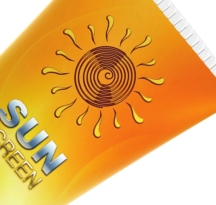healthy GEEZER

Q: Is there anything I can do about all these wrinkles?
The common causes of wrinkles include genetic infl uences, normal aging, sun exposure and smoking. People who smoke tend to have more wrinkles than nonsmokers of the same age, complexion and history of sun exposure. Cigarette smoking causes biochemical changes in our bodies that accelerate aging.
Here's some advice from the American Academy of Dermatology about reducing the signs of aging:
• Wear sunscreen every day because the sun’s rays can accelerate signs of aging. Use a sunscreen or facial moisturizer that offers broad spectrum protection and has an SPF of at least 30. Be sure to apply sunscreen to all skin that is not covered by clothing.
• Do not tan. Getting a tan from the sun or a tanning bed exposes you to harmful UV rays that can accelerate aging, causing wrinkles, age spots, a blotchy complexion and even skin cancer.
• Moisturize. Moisturizing traps water in the skin, which can help reduce the appearance of some fi ne lines and make your complexion look brighter and younger.
• Test products, even those labeled hypoallergenic. To test, dab a small amount of the product on your inner forearm twice a day for four to fi ve days. If you do not have a reaction, it is probably safe to apply to your face.
• Use products as directed. Active ingredients can do more harm than good when too much is used. Applying more than directed can cause clogged pores, a blotchy complexion or other unwanted effects.
• Stop using products that sting or burn unless prescribed by a dermatologist. Irritating the skin makes signs of aging more noticeable.
• Limit the number of skin products that you use. Using too many products on your skin, especially more than one anti-aging product, tends to irritate the skin. This often makes signs of aging more noticeable.
•
Shop smart. People often think that the more expensive a product is,
the more effective it will be. This is not always the case. There are
some very effective, affordable products in the skin-care aisles of your
local stores.
• Give products time to work. While a moisturizer can immediately plump up fi ne lines, most products take at least six weeks to work. Sometimes it can take three months.
Q: How about wrinkle creams?
Research suggests that some wrinkle creams contain ingredients that may improve the appearance of wrinkles. But many of these ingredients haven't undergone scientifi c research to prove this benefi t. The American Academy of Dermatology says that over-the-counter wrinkle creams do little or nothing to reverse wrinkles.
However,
the U.S. Food and Drug Administration has approved prescription
tretinoin cream to treat aging skin. In addition, the FDA has also
approved lasers for skin treatment.
Tretinoin cream, which is a vitamin A derivative, is sold under the brand names such as Atralin, Avita, Renova, Retin-A and Tretin-X.
Tretinoin cream is approved for reducing the appearance of fi ne wrinkles, roughness and dark spots. It will not eliminate wrinkles. It will not restore skin.
Lasers remove layers of skin. Laser therapy is an outpatient treatment requiring anesthesia.
Fred Cicetti is a freelance writer who specializes in health. He has been writing professionally since 1963. Before he began freelancing, he was a reporter and columnist for three daily newspapers in New Jersey. If you would like to ask a question, write to fred@healthygeezer.com.
